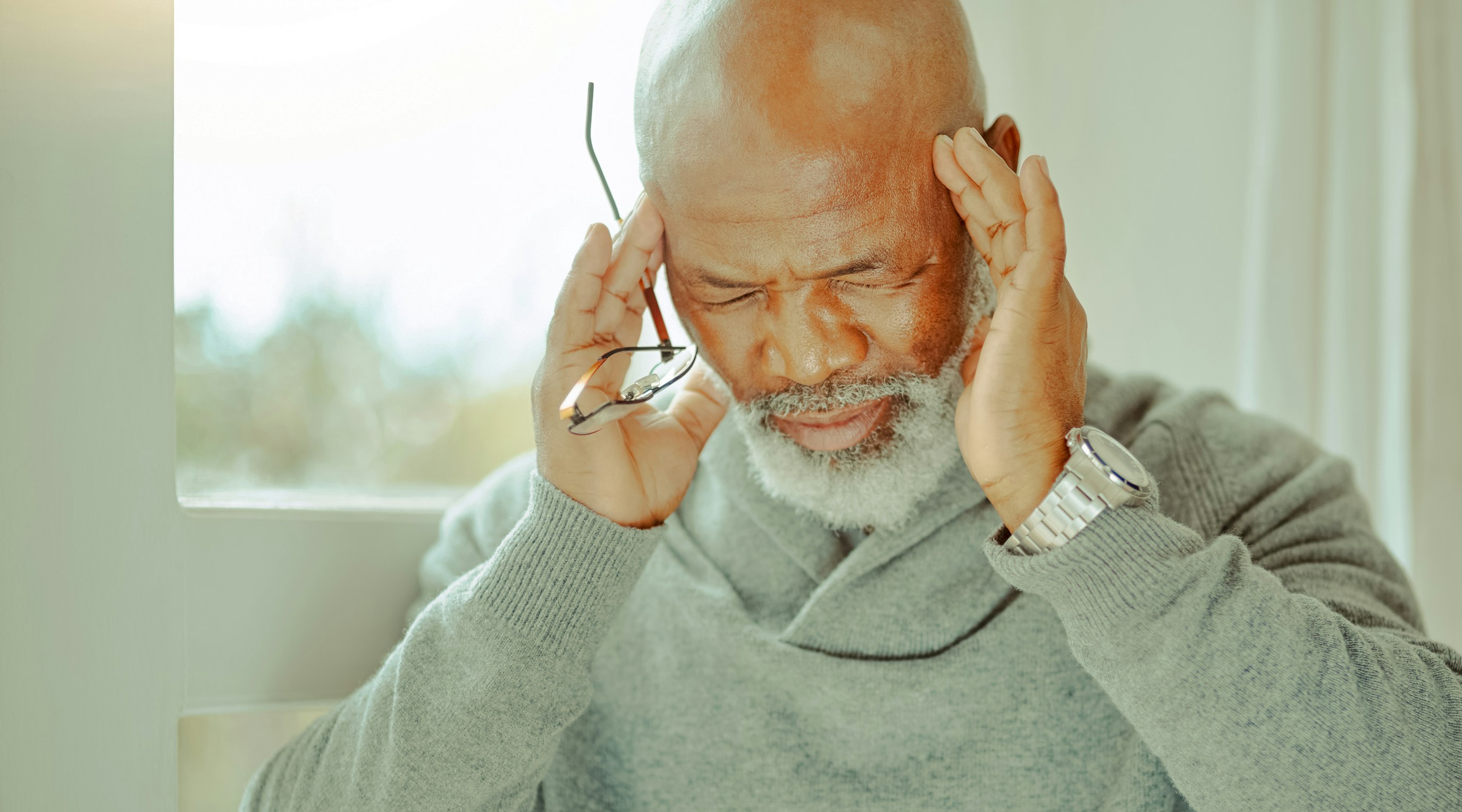Does CBD help with reducing migraines?
8 min read
Kerry Charron
You might be surprised to find out that 190,000 migraine attacks happen in the UK every day. With such massive numbers, the need for new treatment options to help complement conventional pharmaceuticals is obvious, especially when many of these medications come with some pretty heavy side effects.
Contents
Migraines are a type of headache disorder in which individuals experience recurring attacks and related symptoms that can last several minutes or several hours. In addition to the agonizing discomfort experienced during an attack, the stress and fatigue during the recovery phase can make a person feel drained for days.
Migraines hit about 10% of the UK population, and this complex neurological condition is slightly more common in women than men. It often only appears in adulthood, although it can affect children as young as three. Some migraine patients experience 15 or more headache events in a month.
This neurological condition is not the same for any two people, with migraines manifesting in numerous ways. The most common type is a migraine without any warning signs (These warning signs are referred to in medical settings as an aura). Sufferers may also commonly experience some form of aura just before a migraine attack occurs, while others may experience certain auras but no migraine follows. Auras take many forms, with seeing zigzag lines, feeling numbness or tingling in limbs, feeling dizzy, or having difficulty speaking all being common.
Some people have migraines frequently, and these attacks can be as often as several times a week. Other people only have a migraine occasionally. Migraines can make a productive day quickly turn into a nightmare with excruciating pain and terrible light and sound sensitivity.
What is CBD?
Cannabidiol, or CBD, is one of the predominant cannabinoids found in both hemp and medical cannabis plants. Research is showing that CBD has potential strong anti-pain properties. It may also offer antianxiety, anti-inflammatory, and antibacterial properties. Unlike its more famous cannabinoid kin, THC, it offers zero intoxicating effects.
Public interest in CBD products has greatly increased over the past few decades. Migraine patients are often looking for a gentle form of relief that is easy to add to a holistic treatment plan and relatively inexpensive. CBD is proving to have the potential to fit the bill, and it may just be the perfect complementary therapeutic option for sufferers of migraines.
Recent studies have offered insight into the possibility that CBD is showing in inhibiting the pain sensitivity of migraines, as well as some of the anxiety that many migraines sufferers feel when an attack begins.
How does CBD work?
CBD has been shown to modulate not only the endocannabinoid system, but also other regulatory systems that affect pain, inflammation, and anxiety levels.
What is the endocannabinoid system?
Only discovered in 1988, the endocannabinoid system (ECS) is one of the most important regulatory messaging systems in the human body. It has a central role in maintaining homeostasis and communicating between cells within the nervous system. The ECS is believed to be involved in modulating pain, mood, appetite, memory, and a host of other physiological functions.
The ECS consists of three main components: endocannabinoids (endogenous cannabinoids), cannabinoid receptors (CB1 and CB2), and metabolic enzymes that break down the endocannabinoids once they have served their purpose. Endocannabinoids act as chemical messengers that are released when the body needs to correct an imbalance, and they bind to cannabinoid receptors on cells. This produces a range of biological effects.
CBD, a phytocannabinoid (meaning a cannabinoid produced outside the human body), has been shown to activate and modulate the endocannabinoid system, which may help the body regulate and reduce pain signals, inflammation, and anxiety levels. While the jury is still out in terms of the exact mechanisms behind the full ability of CBD in terms of interaction, research has shown it has some fascinating, and potentially therapeutic, qualities.
The potential effects of CBD on migraines
CBD can potentially reduce or stop migraines by activating receptors that affect the pain response and may reduce the muscle tension that often goes hand-in-hand with a serious migraine.
Newly published research studies, along with many patient-based anecdotal reports, point to CBD’s potential effectiveness in easing migraine pain and related symptoms.
One particular study, titled "Characterization of the biochemical and behavioral effects of cannabidiol: implications for migraine”, concluded that CBD has the potential to down modulate migraine-related inflammatory and pain mediators.
“Medical Cannabis, Headaches, and Migraines: A Review of the Current Literature”, a review from 2021 of all the currently available research data surrounding medical cannabis for headaches and migraines, came to similar conclusions. Encouraging data on medicinal cannabis's therapeutic effects on alleviating migraines was found in all the studies reviewed. Beneficial long-term and short-term effects of medicinal cannabis were also reported. It was effective in decreasing daily analgesic intake, dependence, and level of pain intensity. Some patients experienced a prolonged and persistent improvement in their health and well-being (both physically and mentally) after long-term use of medicinal cannabis.
The World Health Organization (WHO) conducted an extensive study of CBD and found it to be not only extremely safe, but also mostly well tolerated in a wide selection of patients. The WHO also determined that CBD had a low potential for abuse or dependence.
One of the main reasons that a large subset of migraine sufferers are interested in taking CBD to help alleviate their pain. With that said, there are some side effects that you should be aware of.
Risks and side effects of using CBD for migraines
CBD use can cause nausea, diarrhoea, lethargy, and dizziness. These are only rarely reported and usually subside rapidly once the CBD has cleared from the system. It can also decrease the appetite in patients, but again, this is quite rarely reported.
There is a risk of liver damage with excessive use of CBD, but many health professionals believe a patient would have to ingest a ridiculously excessive amount of a CBD product to reach toxicity. CBD also has the ability to negatively interact with a small range of pharmaceuticals.
All of this lends credence to the fact that, if you are interested in adding CBD to your current treatment plant, then you should first discuss the idea with your doctor. Or even better, a doctor that is experienced in prescribing medicinal cannabis. Here in the UK, only certain doctors that are registered to prescribe medicinal cannabis can do so, and they will also be able to provide the best advice in terms of dose size, frequency, and the type of CBD medication that will be most effective.
Choosing premium quality CBD products will help avoid any reactions. Most high-quality products are free of certain impurities that might cause a negative reaction, so make sure you are selective when it comes to a CBD company’s manufacturing and testing policies.
The over-the-counter CBD market, while regulated, comes with less oversight than the medicinal sector.
How to use CBD for migraines
Again, it is best to seek the guidance of a doctor, but if you do decide to go down the over-the-counter road, then there are some guidelines that you should stick to.
Most migraine sufferers will take a small, daily dose of CBD to help lessen the chances of a migraine attack occurring, and will also take a slightly larger dose should a migraine hit.
CBD experts recommend “the slow and low” approach in which a person starts slowly with low or small doses and then slowly increases over time. Titration is the process of slowly increasing medication doses and observing the effects. This process allows migraine sufferers to determine the most ideal dose size and frequency of CBD for their wellness needs.
Forms of CBD for migraine treatment
The range of CBD options now available to patients is pretty impressive.
CBD oil is the most popular form of CBD and can be taken orally or, for fasting-acting effects, sublingually (under the tongue) CBD oils that can be taken sublingually are actually “tinctures”, but are often grouped together with CBD oils.
For the fastest onset of effects and the best potential chance at stopping a migraine dead in its tracks, then the inhalation route is the way to go. Many patients are totally averse to the idea of smoking medical cannabis, and this makes sense. Smoking comes with a range of respiratory implications, and we don't recommend taking this route.
However, vaporising medical cannabis that contains high levels of CBD offers the same rapid onset of effects, as the vapour allows the contained cannabinoids and terpenes to hit the bloodstream almost instantly. And it does so without many of the health concerns that smoking brings.
CBD is gentle and easy to add to almost any migraine treatment plan. While CBD does have the potential to negatively interact with certain pharmaceutical medications, these medications are rarely administered for migraines.
The wrap up
CBD products represent a promising treatment supplement to many current migraine patients’ care plans. Consult your prescribing physician to discuss risks, dosing, and other questions. CBD can enhance one’s overall wellness while countering the challenges of migraine disorder.
If you have any more questions, we are here to help! At Releaf, we offer an all-in-one medicinal cannabis service. From initial consultation, to you recieving your doorstep delivered treatment options, and all the support in between and after, our mission is to bring understanding to the potential healing poswer cannabis, while also removing the stigma.
Releaf understands the importance of medical cannabis in treating various medical conditions. With our tailored monthly packages, specialist consultations for medical cannabis, and a unique medical cannabis card for protection, you can access the treatment you need without worrying about the stigma.
Share article
Did you like this article?
It is important to seek medical advice before starting any new treatments. The patient advisors at Releaf are available to provide expert advice and support. Alternatively, click here to book a consultation with one of our specialist doctors.
Elevate your wellness with medical cannabis
Get comprehensive care, convenience, and confidence with an all-in-one treatment plan.
Am I eligible?Authors
Kerry, with experience as a medicinal cannabis cultivation technician and expertise in business licensing applications, is passionate about developing educational content and advocating for better access to medical cannabis worldwide.
Editorial Policy
All of our articles are written by medical cannabis experts, guided by strict sourcing guidelines, and reference peer-reviewed studies and credible academic research. Our expert clinical team and compliance specialists provide valuable insights to ensure accuracy when required. Learn more in our editorial policy.
Need more help?










